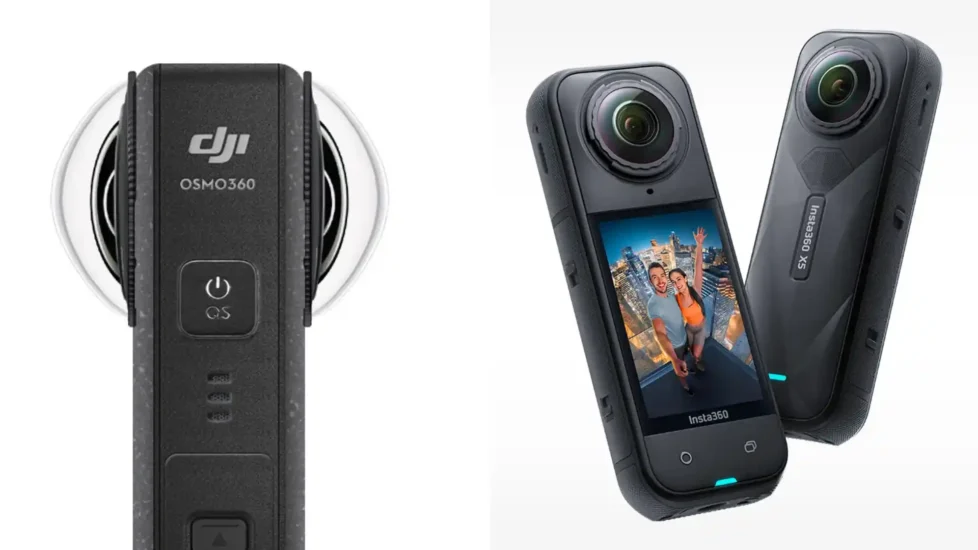DJI Osmo 360 vs Insta360 X5 – If you’re looking to capture stunning 360° content in 2025, two names dominate the conversation: DJI’s Osmo 360 and Insta360’s X5. Both promise incredible image quality, smart features, and portability — but which one is worth your money?
Let’s dive into a detailed head-to-head comparison, covering design, performance, low-light capability, frame rates, battery life, audio quality, accessories, and price.
1. Design & Build Quality
DJI Osmo 360
-
Compact and slightly slimmer in hand
-
Higher-quality materials with a premium feel
-
1.4-inch circular OLED touchscreen — bright, responsive, and easy to navigate
-
Clear and user-friendly interface
Insta360 X5
-
Slightly bulkier
-
Still solid in build quality, with a refined finish
-
Similar touchscreen size, but DJI’s feels more fluid in operation
Verdict: If aesthetics and handling matter, DJI’s Osmo 360 takes a slight edge with its sleeker design.
2. Image Quality & Resolution
Both cameras boast 5.7K 360° video capabilities, but the differences lie in the sensor setup and processing.
-
DJI Osmo 360 produces natural, true-to-life colors with excellent detail retention.
-
Insta360 X5 offers vivid, punchier colors that pop on social media.
If you value color accuracy, DJI is your pick. For social-media-friendly vibrancy, Insta360 shines.
3. Low-Light Performance
Low-light shooting is a weakness for most 360 cameras — but not here.
-
DJI Osmo 360: Impressively clean footage with minimal noise, thanks to its optimized low-light algorithms.
-
Insta360 X5: Great performance, though shadows can be slightly grainier compared to DJI.
Winner: DJI — slightly better clarity in challenging lighting.
4. Frame Rates & Shooting Modes
Both support:
-
5.7K at 30fps
-
4K at up to 60fps
-
Various slow-motion modes
However, DJI offers smoother transitions between modes and slightly better stabilization in action-heavy shots.
5. Single-Lens Mode
If you want to use your 360 camera as a traditional wide-angle action cam:
-
DJI Osmo 360: Delivers sharper single-lens footage with cleaner edges.
-
Insta360 X5: Still great, but slightly softer image in single-lens mode.
6. Battery Life & Overheating
Battery performance is a key consideration for creators on the go.
-
DJI Osmo 360: Around 60–70 minutes of continuous 5.7K shooting without overheating.
-
Insta360 X5: Similar battery life, but gets warmer under extended 4K/60fps loads.
7. Audio Quality
-
DJI Osmo 360: Crisp, balanced sound with better wind reduction.
-
Insta360 X5: Loud and clear but slightly more susceptible to wind noise.
8. Accessories & Ecosystem
-
Insta360 X5: Strong ecosystem with a variety of modular accessories, selfie sticks, and mounts.
-
DJI Osmo 360: Growing accessory lineup, but currently smaller compared to Insta360’s offerings.
9. Extra Features & Software
Both have advanced AI editing tools, auto reframing, and robust mobile apps. Insta360’s app is slightly more mature, but DJI’s recent updates have closed the gap significantly.
10. Price & Value
-
DJI Osmo 360: Around $549 at launch
-
Insta360 X5: Around $549 as well
At the same price point, it comes down to which strengths match your needs.
Final Verdict — Which One Should You Choose?
-
Choose the DJI Osmo 360 if: You prioritize low-light performance, premium build quality, true-to-life colors, and better wind-resistant audio.
-
Choose the Insta360 X5 if: You want a vibrant social-media-ready look, a wider accessory ecosystem, and slightly more mature software.
Bottom Line:
Both are excellent 360 cameras for 2025. DJI edges ahead for creators who care about color accuracy and low-light shooting, while Insta360 remains the king of accessories and social media punch.
Rate post











